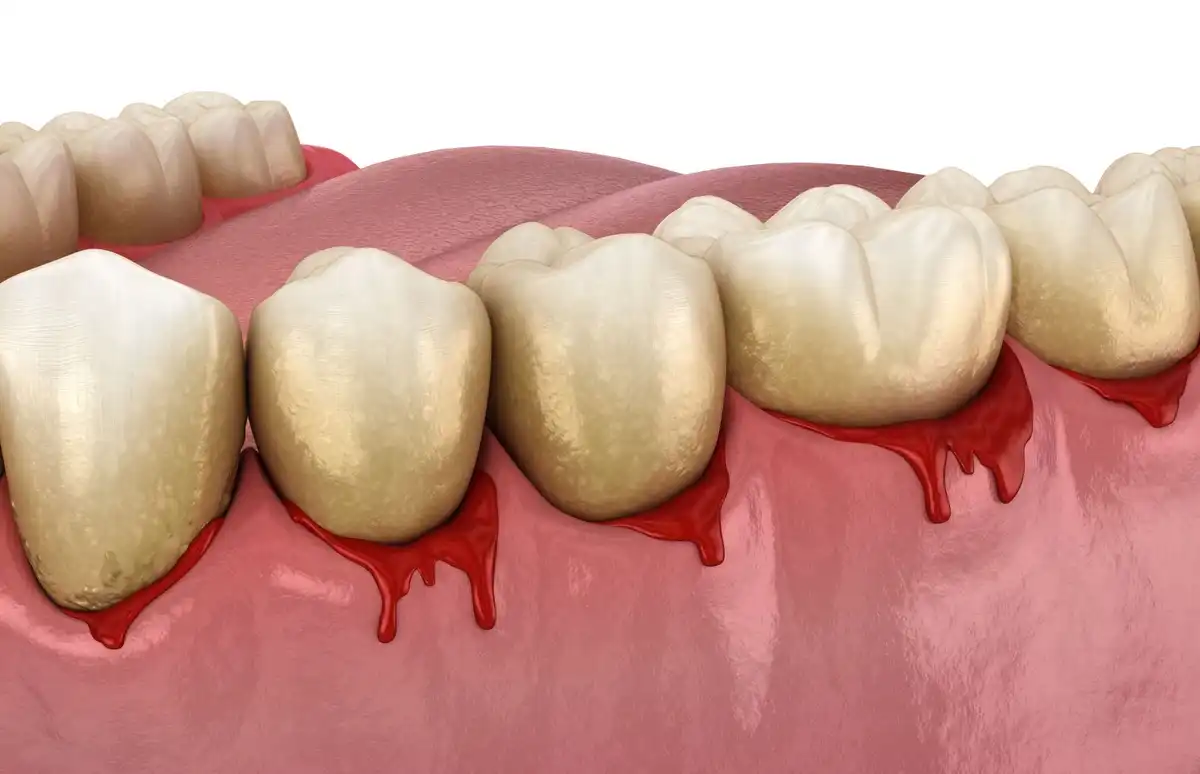Sore Bleeding Gums When Pregnant: Causes & Treatments


Have you noticed changes in your gums? Puffy, bleeding, or sore gums when pregnant could be a normal part of changing hormone levels. It’s fairly common for some women to experience tender gums — and symptoms of gingivitis — during menses, menopause, and you guessed it…pregnancy.
Even though it’s not necessarily a red flag to have sore gums when pregnant, it is vital to rule out gum disease. Why? Because periodontal infections place you at a statistically higher risk of going into labor prematurely, low birth weight, developing preeclampsia, or having a stillborn baby.
Have bleeding or sore gums when pregnant? It’s time to see your dentist. Active gum disease infections can put you and your baby at risk. For active swelling and bleeding gums, pregnancy treatment typically involves a series of preventative or deep cleanings with your hygienist. Physically removing the bacteria below your gumlines helps control the cycle of inflammation and infection. Otherwise, dental plaque can spread through your bloodstream to your baby. Untreated gum infections statistically raise your chances of preeclampsia and preterm birth.
What Causes Bleeding Gums During Pregnancy?
Even if you’ve always had perfectly healthy gums, there’s a moderate chance that you’ll experience some minor symptoms of gingivitis during pregnancy. The good news is that pregnancy gingivitis is usually not severe and as long as you take care of it properly, it won’t be detrimental to your baby. The key is to be proactive, practice good self-care, and rule-out the risk of more serious types of gum infections.
Here’s what to look out for:
1) Fluctuating Hormones
Symptoms
Treatment
Assuming that you’re practicing great oral hygiene (including daily flossing and brushing along the gums) it’s safe to assume that your hormones will stabilize and gum health will improve after giving birth. But if there are serious symptoms at play, you need to see your dentist to rule out any non-hormone gum infections. Your dentist can also assist you with managing pregnancy tumors on your gums, if applicable.
2) Changes In Saliva
Symptoms
Ptyalism — or “excessive saliva” — is an odd but common pregnancy symptom during the first trimester. Sometimes the extra saliva is enough hat it makes women feel like they need to spit frequently throughout the day. Ptyalism is also linked to morning sickness, since women who feel nauseated are less likely to swallow as much as they usually do.
Treatment
3) Morning Sickness
Symptoms
The majority of women experience symptoms of nausea and vomiting throughout their first trimester. Usually, symptoms subside after 12-15 weeks. In rare circumstances, morning sickness can last for the duration of the pregnancy. The hypersensitive gag reflex and increase in acid exposure (due to vomiting) can deter many women from their normal self-care routine of daily brushing and flossing. As a result, they frequently exhibit signs of bleeding gums, gingivitis, and even tooth decay.
Treatment
4) Dietary Changes
Symptoms
Between weird pregnancy cravings and food aversions, you’re probably snacking at all times of the day and eating foods that aren’t normally a part of your everyday diet. A higher intake of carbs and starches, for instance, can produce a larger quantity of bacterial plaque in your mouth after meals. And if you’re sipping on soda to settle your stomach, the sweetener inside of it (sugar-free or not) could be feeding dental plaque and creating extra acid byproducts.
Treatment
Frequent brushing and flossing is extremely important. But rinsing with water immediately after eating and drinking something is also quite helpful. The main goal is to rinse away acids and food debris before they start to contribute to plaque growth along your gumlines. Once 30 minutes has passed, go ahead and brush your teeth if you have a chance (using a fluoride toothpaste, of course!)
5) Diabetes
Symptoms
Treatment
Work with your physician to develop a diabetes treatment plan. Most likely they will place you on a restricted diet and possible prescription medication. You can also positively impact your blood sugar levels by practicing good oral hygiene. Daily brushing and flossing help to eliminate bacterial plaque in your mouth, which can in turn help to stabilize blood glucose levels.
When To Expect Bleeding Gums
But some women experience tender, bleeding gums throughout their gestation, as soon as other pregnancy symptoms start to become evident. If you’re someone who notices a little gingivitis during your period each month, you may be more likely to see bleeding gums when pregnant (and then again later on in menopause.)
Common Symptoms
Swollen, bleeding, or sore gums when pregnant pretty much mirrors traditional gingivitis. You’ll tend to notice some redness and inflammation along the edges of your gums first. Then there’s a pretty good chance that your gums will bleed here and there (again, just at the edges) whenever you brush and floss.
However,…if that inflammation spreads and there are larger areas of redness, or the bleeding is severe, you could have a more serious type of gum infection known as periodontitis. And unfortunately, periodontal disease is clinically proven to be a risk factor for pregnancy complications.
You can tell that pregnancy gingivitis has evolved into periodontal disease when you start to experience tooth mobility, heavy tartar buildup, severe halitosis, and gum recession. But since some symptoms are hard to pick up early, it’s best to get screened by your dentist routinely during your six-month checkups.
Preventing Pregnancy Gingivitis & Bleeding Gums
1) Plan Routine Six-Month Checkups With Your Dentist
Tell your dentist you're pregnant as soon as possible. Your dentist and hygienist will thoroughly screen for early signs of gum disease, including periodontal pockets and gum inflammation. The sooner symptoms are intercepted, the easier they are to treat or reverse.
2) Don’t Skip Your Dental Cleanings
Most dental work can still be done when pregnant. Don't let problems get worse by delaying seeing the dentist. Tartar buildup harbors bacteria that can cause bleeding gums. It only takes about 24 hours for tartar to calcify on the roots of your teeth. Once it does, you can’t remove it on your own.
3) Practice Great Home Care
Brush at least twice a day (focusing along the gums) and floss once daily. Consider using an antiseptic mouth rinse before you go to bed at night.
4) Rinse Your Mouth Out With Water After Snacking
Frequent snacking can increase the bacterial load inside of your mouth. Rinsing with water throughout the day can lower the number of plaque bacteria, acids, and loose food debris to help reduce your chances of swollen or bleeding gums.
5) Chew Gum With Xylitol
This sugar substitute is clinically proven to help reduce plaque buildup on teeth by interfering with their molecular bonds. A few xylitol exposures throughout the day can be helpful if you’re not able to brush your teeth after lunch or that afternoon snack.
Complications Of Bleeding Gums During Pregnancy
Bleeding gums serve as an ample channel for bacteria to spread from your mouth and into your bloodstream. For expectant mothers, this dilemma can be a serious risk. Although minor pregnancy gingivitis or bleeding is typically nothing to be too concerned about, active gum disease is.
With gum disease or periodontitis, there are an ample number of disease-causing bacteria around the affected teeth. As gums detach and bleed, those bacterial colonies can — and do — move into the bloodstream. The cardiovascular system then “pumps” the bacteria-ridden blood throughout the body, increasing inflammation and strain to your immune system. Sadly, those same bacteria can make their way all the way to the placenta and amniotic fluid.
Home Remedies To Treat Your Bleeding Gums
The absolute best bleeding gums pregnancy treatment is good oral hygiene home care, with a focus on flossing. You’ll want to clean just under the edges of the gumlines around each tooth (where bacterial plaque accumulates.) Gently wrap your floss in a “C” shape tightly against each individual tooth, then rub it up and down the side several times. Keep in mind it’s natural to have sore gums when pregnant. Don’t let tenderness or mild bleeding deter you from your daily flossing routine.
If using string floss is too difficult, there’s another alternative for tender, bleeding gums. Pregnancy gingivitis treatment and home care go hand in hand. In this case, a water flosser is super convenient and can flush out hard-to-reach-areas without having to put your fingers in your mouth (which is great if you have a sensitive gag reflex.) Just trace the gumlines and pause for a couple of seconds between teeth to “blast out” any loose plaque.

Myths Of Bleeding Gums When Pregnant
1) Bleeding Gums Means You’re Having A Girl.
There are a lot of old wives’ tales out there that you’ll feel or look a certain way depending on the gender of child you’re carrying. Any woman who has been pregnant knows that her body is a constantly evolving flux of hormones (and emotions to boot!) It’s simply not true that your gums will get swollen or bleed more based on if you’re having a girl or boy; it’s purely coincidental.
2) Bleeding Gums Are Normal When You’re Pregnant.
It’s never “normal” for gums to bleed whether you’re pregnant or not. If you have swollen or bleeding gums, pregnancy treatment like dental checkups and cleanings are a must. Any signs of gum inflammation, bleeding, or sore gums when pregnant could indicate a bacterial infection. Let your dentist be the one to give you the official diagnosis!
Overcoming Pregnancy Gingivitis & Bleeding Gums
Dental diseases like periodontitis, bleeding gums, and pregnancy treatment go hand in hand. If you have sore gums when pregnant, don’t rule it out as a hormonal change; there could be a more serious underlying problem at hand. Although some milder symptoms of swollen gums or occasional bleeding do occur during pregnancy, it’s crucial to rule out periodontal disease (because of the risk to your baby.) By practicing good oral hygiene and scheduling routine cleanings with your dentist’s office, you can enjoy healthy gums, keep your teeth longer, and promote a healthy pregnancy.

Make your inbox smile!
Subscribe






